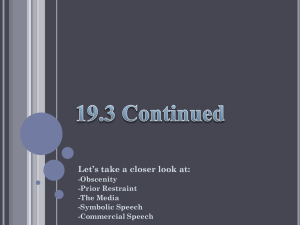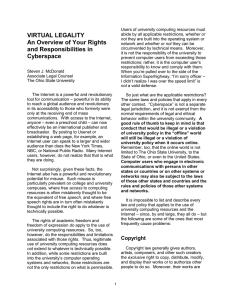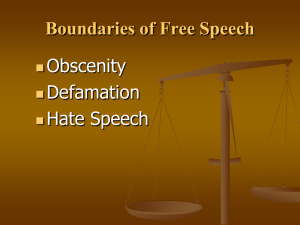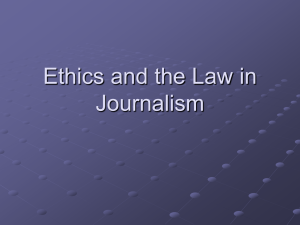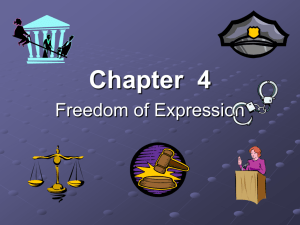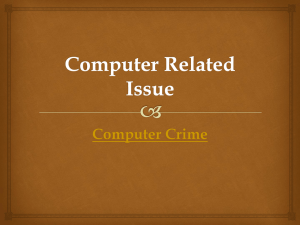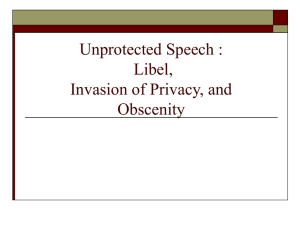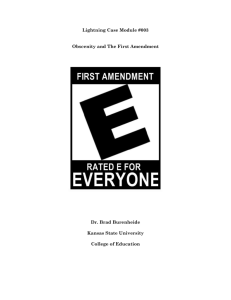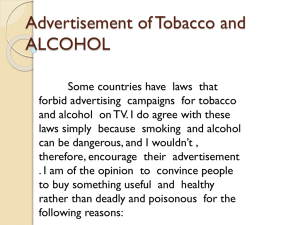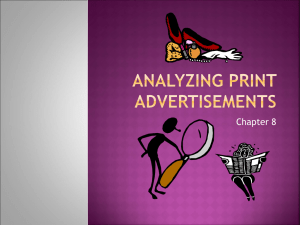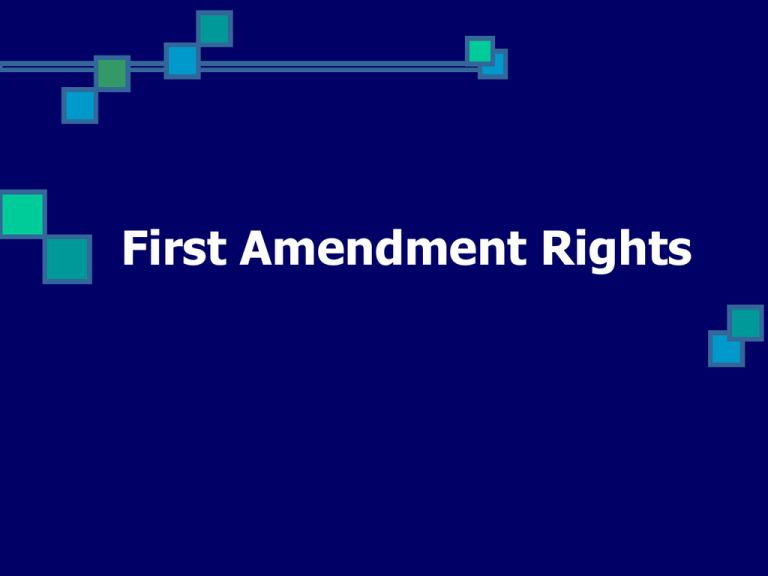
First Amendment Rights
Freedom of Speech
Freedom of Expression
Absolutely Protected Speech
Prior Restraint (PR)
Void for Vagueness
Least Drastic Means
No adopting a law that would infringe upon protected
speech if other “least drastic means” are available to be
used
e.g., a business cannot be deprived freedom of speech; yet
what is says in its ads cannot mislead customers
Content & Viewpoint Neutrality
Laws concerning the time, place or manner of speech that
regulate some kinds of speech but not others are likely
to be struck down
Freedom of Speech
Freedom of Expression
Absolutely Protected Speech
Content & Viewpoint Neutrality
Laws concerning the time, place or manner of speech that
regulate some kinds of speech but not others are likely
to be struck down
Conditionally Protected Speech
Libel/Slander
false statement intentionally made to defame an individual
* difficult to win a libel suit against a newspaper or
magazine
E.g., Reverend Jerry Falwell v Larry Flint
Falwell: leader of Moral Morality, pol commentator
Freedom of Speech
Freedom of Expression
Conditionally Protected Speech
Libel/Slander
E.g., Reverend Jerry Falwell v Larry Flint
Falwell: leader of Moral Morality, pol commentator
Larry Flint: publisher of Hustler
What: Nov 1983, Hustler, a parody, depicting Falwell
drunk & having sex with his own mother
“ad parody – not to be taken seriously”
Charge: libel, invasion of privacy, intentional infliction
of emotional distress
Supreme Court: overturned lower court ruling on
damages (for “privacy” and “distress”)
An obvious satire or parody of public figure are
protected speech.
Freedom of Speech
Freedom of Expression
Conditionally Protected Speech
Libel/Slander
E.g., The New York Times v Sullivan (1964)
What: NY Times’ advertisement (Mar 1960) for soliciting
funds to defend Martin Luther King, Jr. against an Alabama
tax-evasion charge
The ad described police actions against civil rights protesters
Police commissioner L. B. Sullivan charged NY Times for libel
(defamation)
Freedom of Speech
Freedom of Expression
Conditionally Protected Speech
Libel/Slander
E.g., The New York Times v Sullivan (1964)
Supreme Court ruling:
No officials or public figures can collect damages for
comments made about them unless they can prove with
“convincing clarity” the comments were made with
“actual malice.” Thus, the rule of actual malice.
Obscenity and Pornography
Obscene publications are conditionally protected.
Freedom of Speech
Freedom of Expression
Conditionally Protected Speech
Obscenity and Pornography
Defining obscenity (also called Miller Test)
Supreme Court in Miller v California (1973): a work is obscene if it
Appeals to a prurient interest in sex
Depicts or describe in a patently offensive way sexual acts
Lacks serious literary, artistic, political or scientific value.
As a result, government can place restrictions on porn or obscene
materials in following ways:
Who are the readers
Where they can be sold
How they must be packaged
Freedom of Speech
Freedom of Expression
Conditionally Protected Speech
Obscenity and Pornography
Other restrictions:
Using zoning law to regulate adult theaters
Using public nudity laws to regulate nude dancing at adult
nightclubs
Using laws to ban the sale and rental of adult publications in
military facilities
* Condoleezza Rice & Adult publications in State Department
Opponents of Obscene Publications
Political conservatives
Freedom of Speech
Freedom of Expression
Conditionally Protected Speech
Obscenity and Pornography
Opponents of Obscene Publications
Political conservatives
Religious fundamentalists
Feminist groups
Child Pornography & Supreme Court Ruling
New York v. Ferber (1982)
Ruling: Child pornography is not protected because it
Exploits children
Shows acts abusing children
Has negligible artistic value.
Freedom of Speech
Freedom of Expression
Conditionally Protected Speech
Commercial Speech
Question: Newspaper and TV commercials and ads protected by 1st
Amendment?
Yes.
Commercial speech part of the free flow of info for informed
choice & democratic participation
No
Socially irresponsible ads should be outside the 1st Amendment
protection such as gambling, cigarette ads, alcohol ads and
others
Also, false and misleading commercials and ads of illegal
products such as narcotics cannot be protected

